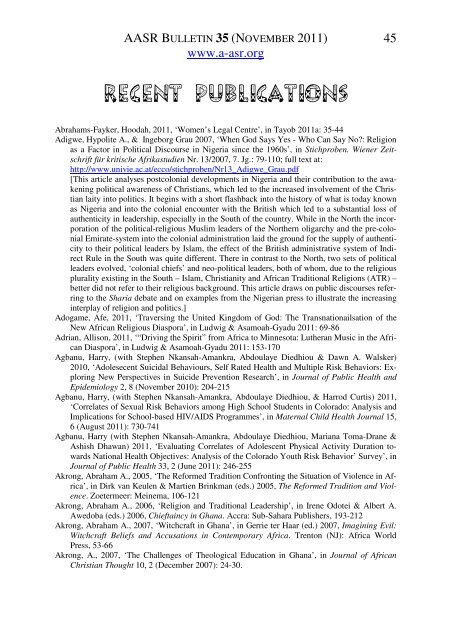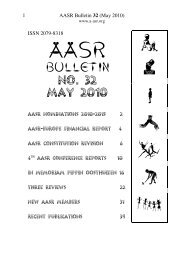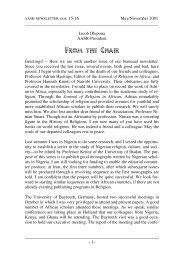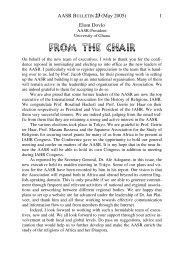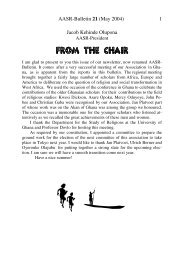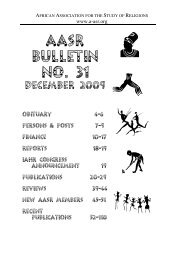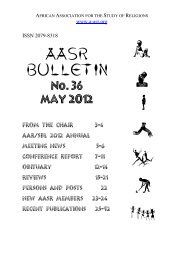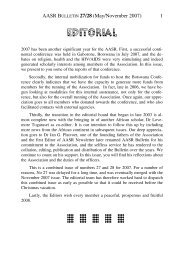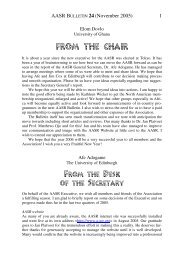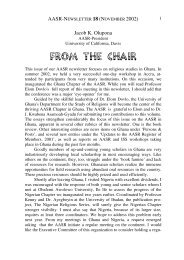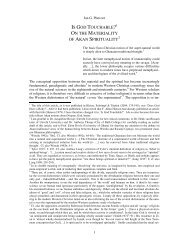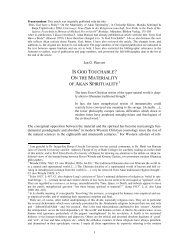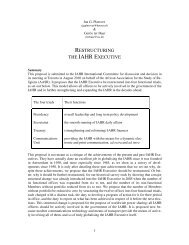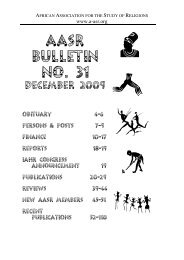AASR Bulletin 35 - The African Association for the Study of Religions
AASR Bulletin 35 - The African Association for the Study of Religions
AASR Bulletin 35 - The African Association for the Study of Religions
You also want an ePaper? Increase the reach of your titles
YUMPU automatically turns print PDFs into web optimized ePapers that Google loves.
<strong>AASR</strong> BULLETIN <strong>35</strong> (NOVEMBER 2011)<br />
www.a-asr.org<br />
45<br />
RECENT PUBLICATIONS<br />
Abrahams-Fayker, Hoodah, 2011, ‘Women’s Legal Centre’, in Tayob 2011a: <strong>35</strong>-44<br />
Adigwe, Hypolite A., & Ingeborg Grau 2007, ‘When God Says Yes - Who Can Say No: Religion<br />
as a Factor in Political Discourse in Nigeria since <strong>the</strong> 1960s’, in Stichproben. Wiener Zeitschrift<br />
für kritische Afrikastudien Nr. 13/2007, 7. Jg.: 79-110; full text at:<br />
http://www.univie.ac.at/ecco/stichproben/Nr13_Adigwe_Grau.pdf<br />
[This article analyses postcolonial developments in Nigeria and <strong>the</strong>ir contribution to <strong>the</strong> awakening<br />
political awareness <strong>of</strong> Christians, which led to <strong>the</strong> increased involvement <strong>of</strong> <strong>the</strong> Christian<br />
laity into politics. It begins with a short flashback into <strong>the</strong> history <strong>of</strong> what is today known<br />
as Nigeria and into <strong>the</strong> colonial encounter with <strong>the</strong> British which led to a substantial loss <strong>of</strong><br />
au<strong>the</strong>nticity in leadership, especially in <strong>the</strong> South <strong>of</strong> <strong>the</strong> country. While in <strong>the</strong> North <strong>the</strong> incorporation<br />
<strong>of</strong> <strong>the</strong> political-religious Muslim leaders <strong>of</strong> <strong>the</strong> Nor<strong>the</strong>rn oligarchy and <strong>the</strong> pre-colonial<br />
Emirate-system into <strong>the</strong> colonial administration laid <strong>the</strong> ground <strong>for</strong> <strong>the</strong> supply <strong>of</strong> au<strong>the</strong>nticity<br />
to <strong>the</strong>ir political leaders by Islam, <strong>the</strong> effect <strong>of</strong> <strong>the</strong> British administrative system <strong>of</strong> Indirect<br />
Rule in <strong>the</strong> South was quite different. <strong>The</strong>re in contrast to <strong>the</strong> North, two sets <strong>of</strong> political<br />
leaders evolved, ‘colonial chiefs’ and neo-political leaders, both <strong>of</strong> whom, due to <strong>the</strong> religious<br />
plurality existing in <strong>the</strong> South – Islam, Christianity and <strong>African</strong> Traditional <strong>Religions</strong> (ATR) –<br />
better did not refer to <strong>the</strong>ir religious background. This article draws on public discourses referring<br />
to <strong>the</strong> Sharia debate and on examples from <strong>the</strong> Nigerian press to illustrate <strong>the</strong> increasing<br />
interplay <strong>of</strong> religion and politics.]<br />
Adogame, Afe, 2011, ‘Traversing <strong>the</strong> United Kingdom <strong>of</strong> God: <strong>The</strong> Transnationailsation <strong>of</strong> <strong>the</strong><br />
New <strong>African</strong> Religious Diaspora’, in Ludwig & Asamoah-Gyadu 2011: 69-86<br />
Adrian, Allison, 2011, ‘“Driving <strong>the</strong> Spirit” from Africa to Minnesota: Lu<strong>the</strong>ran Music in <strong>the</strong> <strong>African</strong><br />
Diaspora’, in Ludwig & Asamoah-Gyadu 2011: 153-170<br />
Agbanu, Harry, (with Stephen Nkansah-Amankra, Abdoulaye Diedhiou & Dawn A. Walsker)<br />
2010, ‘Adolesecent Suicidal Behaviours, Self Rated Health and Multiple Risk Behaviors: Exploring<br />
New Perspectives in Suicide Prevention Research’, in Journal <strong>of</strong> Public Health and<br />
Epidemiology 2, 8 (November 2010): 204-215<br />
Agbanu, Harry, (with Stephen Nkansah-Amankra, Abdoulaye Diedhiou, & Harrod Curtis) 2011,<br />
‘Correlates <strong>of</strong> Sexual Risk Behaviors among High School Students in Colorado: Analysis and<br />
Implications <strong>for</strong> School-based HIV/AIDS Programmes’, in Maternal Child Health Journal 15,<br />
6 (August 2011): 730-741<br />
Agbanu, Harry (with Stephen Nkansah-Amankra, Abdoulaye Diedhiou, Mariana Toma-Drane &<br />
Ashish Dhawan) 2011, ‘Evaluating Correlates <strong>of</strong> Adolescent Physical Activity Duration towards<br />
National Health Objectives: Analysis <strong>of</strong> <strong>the</strong> Colorado Youth Risk Behavior’ Survey’, in<br />
Journal <strong>of</strong> Public Health 33, 2 (June 2011): 246-255<br />
Akrong, Abraham A., 2005, ‘<strong>The</strong> Re<strong>for</strong>med Tradition Confronting <strong>the</strong> Situation <strong>of</strong> Violence in Africa’,<br />
in Dirk van Keulen & Martien Brinkman (eds.) 2005, <strong>The</strong> Re<strong>for</strong>med Tradition and Violence.<br />
Zoetermeer: Meinema, 106-121<br />
Akrong, Abraham A., 2006, ‘Religion and Traditional Leadership’, in Irene Odotei & Albert A.<br />
Awedoba (eds.) 2006, Chieftaincy in Ghana. Accra: Sub-Sahara Publishers, 193-212<br />
Akrong, Abraham A., 2007, ‘Witchcraft in Ghana’, in Gerrie ter Haar (ed.) 2007, Imagining Evil:<br />
Witchcraft Beliefs and Accusations in Contemporary Africa. Trenton (NJ): Africa World<br />
Press, 53-66<br />
Akrong, A., 2007, ‘<strong>The</strong> Challenges <strong>of</strong> <strong>The</strong>ological Education in Ghana’, in Journal <strong>of</strong> <strong>African</strong><br />
Christian Thought 10, 2 (December 2007): 24-30.


